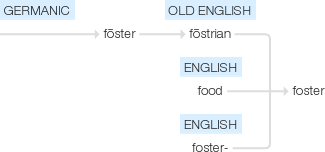Foster
Old English fōstrian ‘feed, nourish’, from fōster ‘food, nourishment’, of Germanic origin; related to food. The sense ‘bring up another's (originally also one's own) child’ dates from Middle English. See also foster-.
wiktionary
From Middle English foster, from Old English fōstor(“food, sustenance”), from Proto-Germanic *fōstrą(“nourishment, food”). Cognate with Middle Dutch voester(“nursemaid”), Middle Low German vôster(“food”), Old Norse fóstr(“nurturing, education, alimony, child support”), Danish foster(“fetus”), Swedish foster(“fetus”).
foster (plural fosters)
etymonline
foster (v.)
Old English *fostrian "to supply with food, nourish, support," from fostor "food, nourishment, bringing up," from Proto-Germanic *fostra-, from extended form of PIE root *pa- "to feed."
Meaning "to bring up a child with parental care" is from c. 1200; that of "to encourage or help grow" is early 13c. of things; 1560s of feelings, ideas, etc. Old English also had the word as an adjective meaning "in the same family but not related," in fostorfæder, fostorcild, fostormodoretc. Related: Fostered; fostering.
